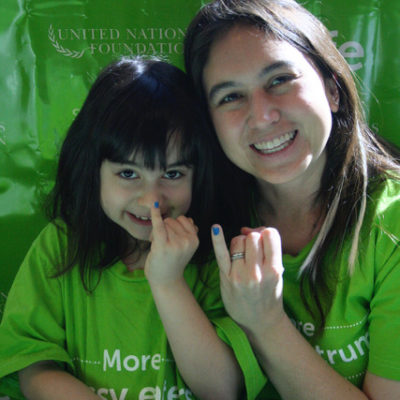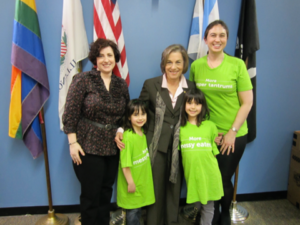Can Advocacy Make Your Kids’ Lives Better?
On Mother's Day, we celebrate mothers like Shot@Life Champion Cynthia Levin, who inspires us with her determination to make an impact—not only for her children, but for children around the world.

 I took my children, ages six and eight, to meet with Congresswoman Jan Schakowsky on a summer afternoon to lobby for global vaccines on behalf of the UN Foundation’s Shot@Life campaign. Besides just standing around and looking cute, my kids had been assigned the task of showing the congresswoman a newspaper article describing an awareness event we had done for moms and kids at our house.
I took my children, ages six and eight, to meet with Congresswoman Jan Schakowsky on a summer afternoon to lobby for global vaccines on behalf of the UN Foundation’s Shot@Life campaign. Besides just standing around and looking cute, my kids had been assigned the task of showing the congresswoman a newspaper article describing an awareness event we had done for moms and kids at our house.
After fulfilling her role, my youngest daughter grew utterly bored with the topic of program funding and started to create a picture of all of us. After our discussion, the congresswoman glanced over at her masterpiece. “Is that me?” she asked, pointing to a figure in the drawing.
“Yes, and that’s me and my sister and that’s Mommy,” my artist proudly proclaimed.
The congresswoman smiled. “You know what? I really like this picture because I’m pretty short and you drew me taller than everyone! I love it!” Congresswoman Schakowsky then leaned in to give a brief and furious tickle to my now-giggling daughter.
“Wow,” I thought. “I would never, ever have imagined having that kind of familiar relationship with someone so important at that age. If my kids aren’t afraid of their representative now, what in the world will they accomplish with their members of Congress when they’re all grown up?”
I still smile when I think of that bond between my kids and my congresswoman—a woman I had initially been so scared to meet. I had never even seen a U.S. representative in real life before our first meeting, and my sweaty palms and wavering voice put my nervousness on full display back then.
 My children will have hurdles to overcome in their lives, but they will never think they aren’t worthy to speak with a member of Congress. They might even think it’s strange NOT to check in with their elected officials from time to time. Sure, they may not choose to become anti-poverty advocates—or any type of activist at all. But if they ever discover they cannot stay silent about an issue, my daughters will have the tools they need to speak out. Together, we’ve already removed the barrier that makes most people wonder, “Can we really talk to Congress? Will it even make a difference?”
My children will have hurdles to overcome in their lives, but they will never think they aren’t worthy to speak with a member of Congress. They might even think it’s strange NOT to check in with their elected officials from time to time. Sure, they may not choose to become anti-poverty advocates—or any type of activist at all. But if they ever discover they cannot stay silent about an issue, my daughters will have the tools they need to speak out. Together, we’ve already removed the barrier that makes most people wonder, “Can we really talk to Congress? Will it even make a difference?”
I have met mothers who are hesitant to involve their children in advocacy for various reasons. Some tykes simply can’t sit still in a meeting. Some moms feel like they can barely get themselves organized to take an action much less include kids and all the accompanying chaos. I will admit that it all depends on the individual personalities and readiness levels of both parent and child. We each have to measure the pros and cons of nurturing advocacy with our particular children.
However, I think it’s far easier for most of us to rattle off all the cons before they even get started. So let me share some of the less obvious pros. What can your kids gain if you involve them in advocacy activities?
· Confidence and skill to express themselves
· Ability to stand up for themselves and others
· Empathy and compassion for others
· Knowledge of how their government works
· Understanding the inequality and oppression inherent in systems and how they affect our lives
They may also lose something: the feeling of being intimidated by people in power. When kids meet many members of Congress as they are growing up, the mystique will fall away. They—and you—will realize that the people running our government are human, too.
